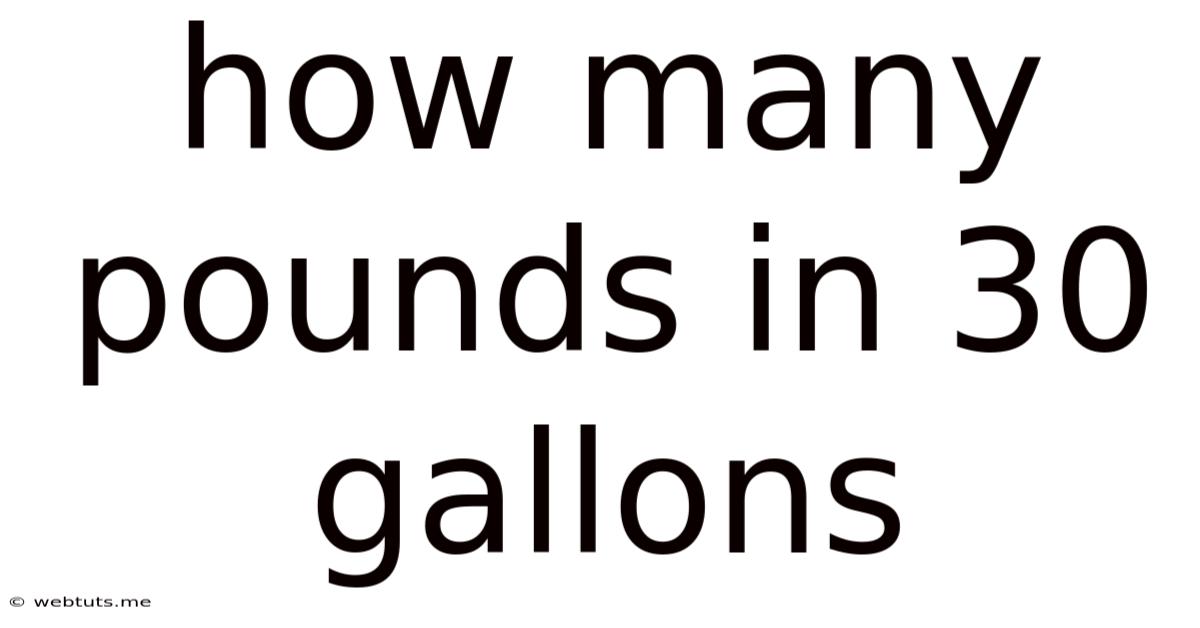How Many Pounds In 30 Gallons
Webtuts
May 10, 2025 · 4 min read

Table of Contents
How Many Pounds in 30 Gallons? A Comprehensive Guide to Weight and Volume Conversions
The question, "How many pounds are in 30 gallons?" doesn't have a simple, single answer. This is because the weight depends entirely on the density of the substance contained within those 30 gallons. A gallon of water weighs significantly less than a gallon of mercury, for instance. This article will explore this complex relationship, providing you with the tools and knowledge to accurately calculate the weight for various substances. We'll also delve into the practical implications of understanding weight-volume conversions, covering topics like shipping, storage, and various applications across different industries.
Understanding Density: The Key to Weight-Volume Conversions
Density is the key factor determining the weight of a given volume. It's defined as mass per unit volume, typically expressed in pounds per gallon (lbs/gal) or kilograms per liter (kg/L). The formula is simple:
Density = Mass / Volume
To find the mass (weight), we rearrange the formula:
Mass = Density x Volume
Therefore, to answer "how many pounds are in 30 gallons," we need to know the density of the substance filling those 30 gallons.
Common Substances and Their Densities
Let's explore the weight of 30 gallons for some common substances:
1. Water:
Water is often the benchmark for these calculations. At standard temperature and pressure, one US gallon of water weighs approximately 8.34 pounds. Therefore, 30 gallons of water would weigh:
30 gallons * 8.34 lbs/gallon = 250.2 pounds
Important Note: This figure can vary slightly based on temperature and purity. Colder water is slightly denser than warmer water.
2. Gasoline:
Gasoline is less dense than water. Its density typically ranges from 6.0 to 6.6 lbs/gallon. Let's use an average of 6.3 lbs/gallon for our calculation:
30 gallons * 6.3 lbs/gallon = 189 pounds
3. Oil:
The density of oil varies greatly depending on the type of oil. Crude oil, for example, might range from 5.5 to 7.5 lbs/gallon, while lubricating oils might have different densities again. To calculate the weight accurately, you need to know the specific gravity or density of the particular oil in question.
4. Milk:
Milk has a density slightly higher than water, approximately 8.6 lbs/gallon. Therefore, 30 gallons of milk would weigh approximately:
30 gallons * 8.6 lbs/gallon = 258 pounds
5. Mercury:
Mercury is considerably denser than water. Its density is around 13.6 lbs/gallon. 30 gallons of mercury would weigh a substantial:
30 gallons * 13.6 lbs/gallon = 408 pounds
This example highlights the significant difference in weight for the same volume depending on the substance.
Practical Applications and Considerations
Understanding weight-volume conversions is crucial in various real-world scenarios:
1. Shipping and Transportation:
Shipping companies calculate freight charges based on weight and volume. Knowing the weight of your goods is essential for accurate cost estimation and efficient logistics. Underestimating the weight can lead to unexpected costs and delays.
2. Storage and Handling:
Storing large quantities of liquids requires understanding their weight to ensure the structural integrity of storage tanks and containers. Overloading a container can lead to structural damage or even collapse.
3. Chemical Engineering and Process Control:
Precise weight-volume calculations are critical in chemical processes, where accurate measurement of reactants and products is essential for quality control and safety.
4. Environmental Monitoring:
Measuring the volume and weight of pollutants is essential for environmental monitoring and regulatory compliance. Understanding the density of contaminants is vital for accurate assessment.
5. Agriculture:
In agriculture, understanding the weight of liquids like fertilizers and pesticides is essential for efficient application and yield optimization.
Beyond Simple Conversions: Dealing with Mixtures and Irregular Shapes
The calculations above assume a pure substance filling a perfectly shaped container. However, real-world applications often involve more complex scenarios:
-
Mixtures: If you're dealing with a mixture of substances, you need to calculate a weighted average density based on the proportion of each component.
-
Irregular Shapes: If your container is not a standard shape (e.g., a cylindrical tank), you might need to use more sophisticated volume calculation methods before applying the density-based weight conversion.
-
Temperature and Pressure Effects: As mentioned earlier, density can change with temperature and pressure. For high-precision calculations, you'll need to account for these variations.
Using Online Calculators and Resources
Several online calculators can help with weight-volume conversions. Simply input the volume and density of your substance, and the calculator will compute the weight. Remember to always double-check the units used by the calculator to ensure accuracy. These online tools can be particularly helpful when dealing with less common substances or complex scenarios.
Conclusion: The Importance of Precise Measurement
Accurately determining the weight of a given volume is essential across a wide range of industries and applications. Understanding the role of density and using appropriate conversion methods ensures efficient operations, accurate cost estimations, and safe handling of materials. This comprehensive guide provides a foundation for tackling weight-volume conversion problems, enabling you to make informed decisions and achieve optimal outcomes in your specific context. Remember that the accuracy of your calculations hinges on the accuracy of the density value you use. Always consult reliable sources for density information relevant to the specific substance you're working with.
Latest Posts
Latest Posts
-
How Many 50 Lb Bags Of Concrete In A Yard
May 11, 2025
-
How Many Cups Are In 4 L
May 11, 2025
-
How Many Cups Are In One And A Half Quarts
May 11, 2025
-
How Many Seconds Is 6 Minutes
May 11, 2025
-
Board Foot To Square Foot Calculator
May 11, 2025
Related Post
Thank you for visiting our website which covers about How Many Pounds In 30 Gallons . We hope the information provided has been useful to you. Feel free to contact us if you have any questions or need further assistance. See you next time and don't miss to bookmark.